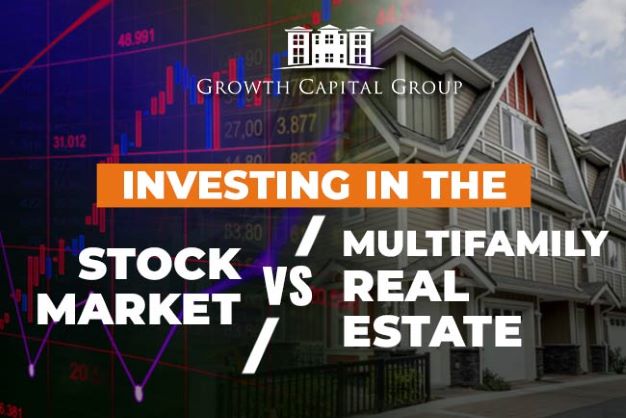There is no doubt that many people have invested in multifamily real estate to build their wealth over time. Similarly to this, many people have made substantial financial gains through stock market investments.
Investing In The Stock Market
A stock market is an investment tool that allows you to purchase shares of publicly traded companies. You can buy individual stocks or invest in mutual funds or exchange-traded funds (ETFs). There are many different strategies for investing in the stock market, but they all have one thing in common: They allow you to buy and sell your holdings whenever you want. For example, if you own shares in Coca-Cola (KO), you can sell them whenever the price goes up or down.
Investing In Multifamily Real Estate
Multifamily real estate refers to investing in apartment buildings where more than one family lives. This type of property has historically provided strong returns for investors because of its low vacancy rates and high rents compared with single-family homes and other types of commercial properties. It also provides diversification across multiple tenants within each building, which helps reduce risk overall when compared with owning one property at a time.
Some investors choose to invest in the stock market, while others opt for real estate. But is one better than the other? Multifamily real estate has several advantages over the stock market:
Low volatility
The average annual return for multifamily real estate is 4 percent, which means that it doesn’t fluctuate as much as stocks do. This makes multifamily real estate less risky than stocks and more stable as an investment vehicle.
One of the biggest reasons why many people choose to invest in multifamily properties is because they can offer a stable revenue stream over time. When compared with other types of investments like stocks, bonds or real estate investment trusts (REITs), multifamily has very low volatility which means that investors don’t have to worry about sudden changes in market conditions affecting their income. This makes it easier for them to plan their budgeting and spending while ensuring that they get regular income regardless of what happens in the economy at large.
Diversification
The main advantage of multifamily real estate is that it can diversify your portfolio and protect against risk. When one type of investment goes down, another may go up simultaneously. For example, if you have all your money invested in stocks and they crash, you’ve lost all of your money unless you have other investments that complement what’s gone down in value (or vice versa). That said, when investing in multifamily properties, it’s important to spread out your holdings across multiple locations so that if one area has trouble getting financing or has market conditions that don’t work well for the property, then another property could still be doing well enough to cover any losses from the first property.
Low-Cost Passive Income
Most multifamily properties generate income from rent and appreciation (or depreciation). The first one is easy to understand — if you have a tenant who pays rent on time every month without fail, you’re earning passive income that keeps coming in while you’re asleep or at work! Appreciation happens when your property increases in value over time due to inflation and appreciation trends.
Leverage
Multifamily real estate allows investors to leverage their money by using other people’s money (OPM). OPM allows investors to buy more property with less of their own cash upfront. The more properties you can buy, the more money you make!
The biggest benefit of multifamily real estate investing is that you are able to use debt in order to buy your investment property. This means that you can purchase a property with money that you don’t actually have in your bank account!
For example, if you put down $10,000 on a $100,000 apartment building and took out a loan for $90,000, your down payment would be 10% ($10,000/$100,000). If you sold your property for $110,000, you would have made $10,000 ($110,000 – $100,000 – $90,000 -$10,000). However, if you had chosen to invest in stocks instead, you would need all those funds upfront to make an investment.
Cash flow
Cash flow is a measure of how much money is coming into your business and how much money is going out. In real estate, cash flow is typically positive (meaning there’s more coming in than going out). But if you invest in stocks or bonds, you’ll probably see negative cash flow until you sell your investment.
Multifamily properties produce cash flow every month, unlike stocks that only pay dividends quarterly or twice a year at best. This means that if interest rates rise, as expected in 2020, rents will go up too because landlords will have no choice but to raise rents for new tenants who want to live there!
Tax Advantages
One of the biggest benefits of investing in multifamily real estate is that it’s tax-advantaged, especially when compared to stocks and bonds. When you sell a stock or bond, you must pay capital gains taxes on any profit. However, suppose you sell an apartment building or other commercial property. In that case, all gains are considered “capital gain” rather than “ordinary income,” which means they are taxed at 20% rather than 39% (for individuals).
One of the primary benefits of investing in multifamily real estate is deducting your mortgage interest and property taxes from your federal income taxes. In addition, if you’re like most people, your state and local governments will also give you a property tax deduction. These deductions can significantly reduce your income taxes, meaning thousands more dollars in your pocket for multifamily investment properties.
Final Thought
Real estate might sound like a safer option, but if you choose multifamily real estate as your investment vehicle, you have the ability to diversify and mitigate risk. This gives you more control over your financial future than playing a game of chance in the stock market. If you prefer something less risky and more conservative, however, multifamily real estate may be your better choice.
Schedule A Free Strategy Call To Know More About Multifamily Real Estate Investing. Growth Capital Group Is Here To Help You.

